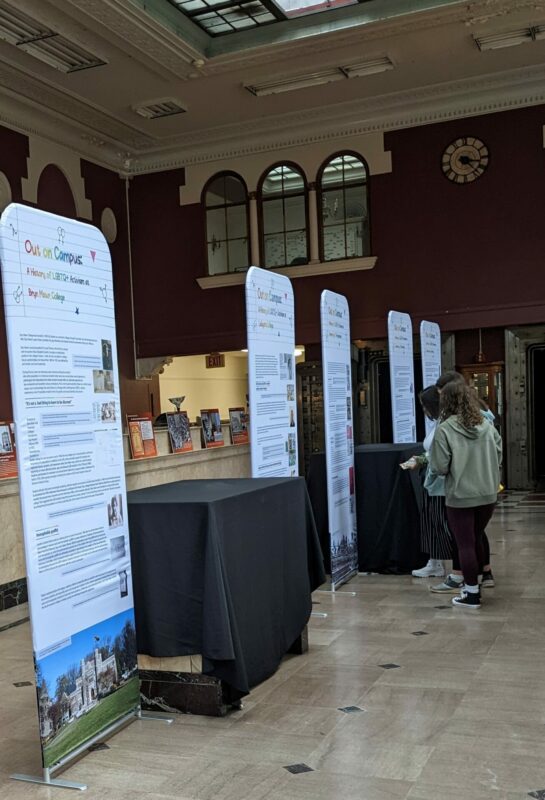Out on Campus: An Interview with Curator Barry Loveland (Part One)
02 December 2022 – Marc Stein and Barry Loveland
In August, the Pennsylvania LGBT History Network completed its latest traveling exhibit, titled Out on Campus: A History of LGBTQ+ Activism at Pennsylvania College and Universities. The exhibit is currently scheduled for visits at nine locations around the state, including various colleges and universities and LGBT community centers. Out on Campus provides excellent opportunities for learning about LGBTQ+ history, thinking about public history partnerships, and reflecting on higher education’s roles and responsibilities in social justice struggles. San Francisco State University historian Marc Stein, a consultant and contributor for Out on Campus, conducted this interview with Barry Loveland, the exhibit organizer and curator, in August 2022. Part Two of the interview can be found here.
Marc Stein (MS): What is the Pennsylvania LGBT History Network?
Barry Loveland (BL): The Pennsylvania LGBT History Network began with an initial meeting of nearly forty interested individuals and representatives of organizations on December 2, 2016, at the William Way LGBT Community Center in Philadelphia. The initial activities included establishing a Google Group as a primary method of communication and a Facebook page as a method of promoting projects and events. Another initiative was to have participating organizations update or create new listings of their LGBTQ+ archival collections in the Lavender Legacies database of the Society of American Archivists. The first collaborative project was the development of a traveling exhibit in 2019, and that led to the creation of two more traveling exhibits in 2020 and 2022. Other initiatives include encouraging the submission of nominations to the Pennsylvania Historical and Museum Commission for state historical markers (which yielded several new markers) and for listings in the National Register of Historic Places. The organization also held a virtual workshop in 2021 for educators in teaching LGBTQ+ history and created the first-ever statewide LGBTQ+ History Prize for the 2022 National History Day in Pennsylvania.

Opening reception of the Out on Campus exhibit on August 19, 2022, at the Historic Harrisburg Resource Center, Harrisburg, Pennsylvania. Photograph courtesy of the LGBT Center of Central PA History Project.
MS: Can you describe the organization’s previous traveling exhibits and highlight their main successes?
BL: The first collaborative project was the development of a traveling exhibit, The Long Road to LGBTQ+ Equality in Pennsylvania, to help commemorate the 50th anniversary of the Stonewall riots in 2019. This exhibit tells the story of the efforts of activists from across Pennsylvania to obtain LGBTQ+ civil rights at the state and local levels, through text, historical photographs, and video clips. Three copies of this exhibit circulated all over Pennsylvania to nearly fifty venues, including two secondary schools, twenty-three colleges and universities, three public libraries, two historical organizations, five government facilities (including the PA State Capitol), three LGBTQ+ community centers, and three senior living facilities. It has been to ten events, including two transgender conferences, three pride festivals, a Gay/Straight Alliance conference, and three gay men’s chorus concerts. One copy of the exhibit continues to circulate and an online digital version of the exhibit and a teachers’ lesson plan are also available. (For an example of news coverage from a university hosting the exhibit, see The Long Road to LGBTQ+ Equality in Pennsylvania’ exhibit on display at LHU Stevenson Library through April 30.)
The second collaborative project was the adaptation of a static exhibit that was on display at the William Way LGBT Center in Philadelphia in 2019, With Open Heart and Open Arms: LGBTQ+ Cuban Refugees and the LGBTQ+ Community’s Response to the Mariel Boatlift of 1980. We worked with John Anderies, the curator of this exhibit, and others to do additional research and make minor changes to the exhibit to create a traveling version. The exhibit tells the story—through text, historical photographs, documents, and video clips—of the many LGBTQ+ Cubans who traveled on boats to the United States in 1980; their experiences of processing and resettlement in Pennsylvania; and the experiences of the Pennsylvania LGBTQ+ community in assisting in their resettlement. Fort Indiantown Gap in central Pennsylvania was one of the three national resettlement processing facilities in the country. One copy of the exhibit premiered in 2020 on the 40th anniversary of the Mariel Boatlift at the Historic Harrisburg Resource Center and has since traveled to eight colleges and universities and the State Library of Pennsylvania. A digital version of the exhibit and a teachers’ lesson plan are also available online. During the premiere of the exhibit in April 2020, a panel discussion was held over Zoom with the exhibit curator, a local newspaper reporter who broke the story at Fort Indiantown Gap, a photographer who captured stunning images of the LGBTQ+ refugees in 1980, and one of the Cuban refugees from the Mariel Boatlift. (For local media coverage of the grand opening of the exhibit, see Traveling exhibit recognizes history of LGBTQ+ Cuban refugees in PA.)
Our first two traveling exhibits very much informed our work on the new Out on Campus project, which is discussed in Part Two of this conversation.
~ Marc Stein is the Jamie and Phyllis Pasker Professor of History at San Francisco State University and the coeditor of Queer Pasts (Alexander Street/ProQuest). He is the author, most recently, of The Stonewall Riots: A Documentary History (NYU Press, 2019); Queer Public History: Essays on Scholarly Activism (University of California Press, 2022); and the forthcoming second edition of Rethinking the Gay and Lesbian Movement (Routledge, 2023).
~ Barry Loveland is the co-founder and chair of the LGBT Center of Central Pennsylvania History Project and coordinator of the Pennsylvania LGBT History Network. He was chief of the Division of Architecture and Preservation at the Pennsylvania Historical and Museum Commission for more than 30 years until his retirement in 2015. He is the co-author with William Burton of Out in Central Pennsylvania: The History of an LGBTQ Community (Penn State University Press, 2020).



